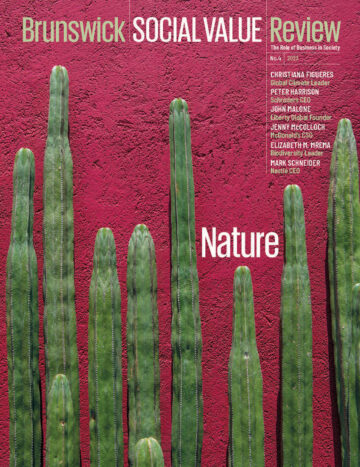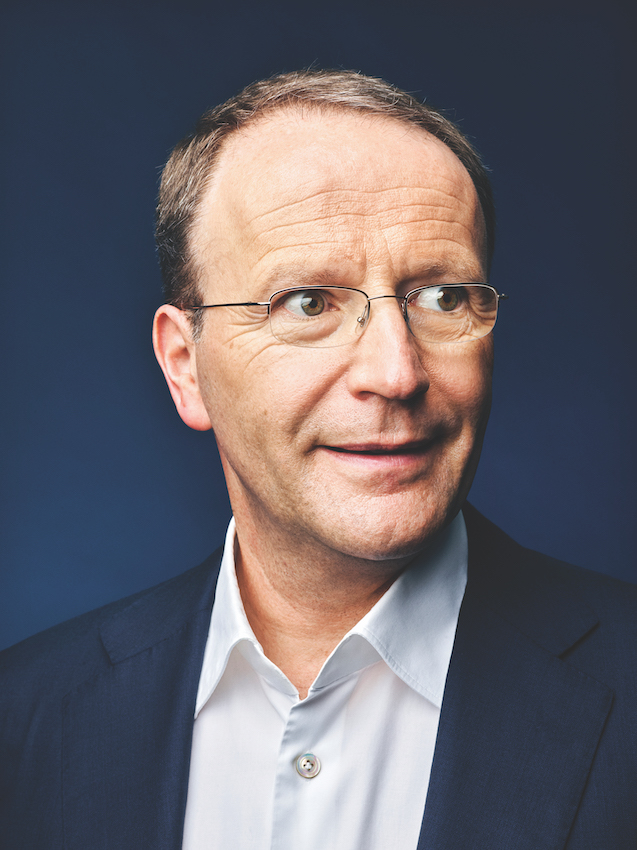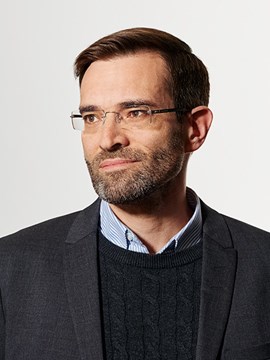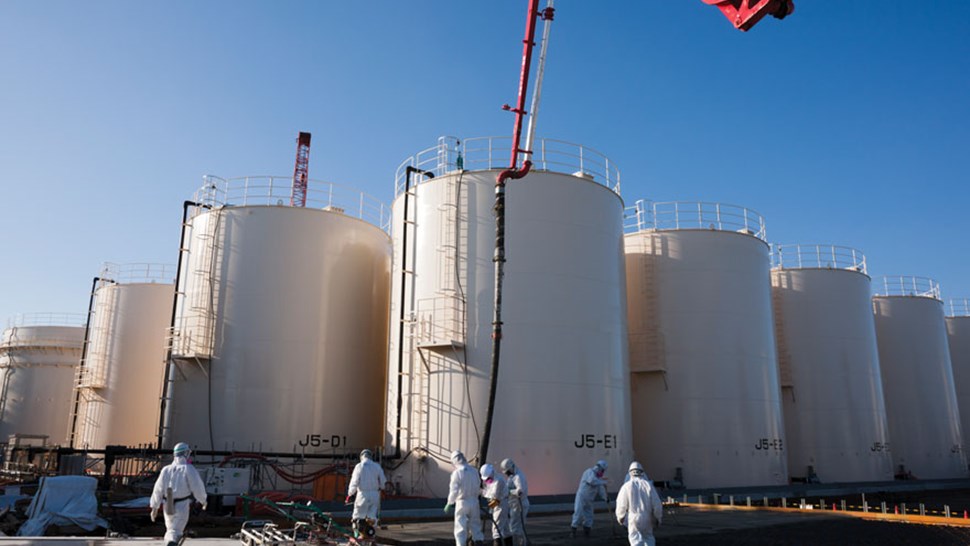An introduction to the fourth edition of the Brunswick Social Value Review from the Editors in Chief.
Welcome to this edition of the Brunswick Social Value Review, which aims to chronicle the growing pressure on companies to demonstrate that they are part of the solution to the world’s great challenges, and to show what leadership looks like in this space.
We launched the Social Value Review in 2020 with a special focus on the Climate Crisis, and in this issue we turn to a parallel environmental challenge—the Biodiversity Crisis, which is growing in intensity and urgency. Nature, then, is the focus of this edition.
As ever, we begin by looking at the data. It’s an arresting picture: All the key indications on biodiversity are flashing red. We see how scientists are warning of an approaching mass extinction—an eighth of all known species are expected to be lost—and the prospect of widespread ecosystem collapse.
It’s become increasingly clear that biodiversity loss is not only an environmental issue—it’s also a critical business issue. A major global company CEO once told us that habitat destruction was sometimes necessary for progress: “I’m pro-human, not pro-toad,” he said. Today, most people would see this as a false choice. The World Economic Forum calculates that more than half of our global GDP depends directly on nature. This may even be a conservative estimate because a rapid biodiversity collapse would have the knock-on effects of undermining global food systems, disrupting supply chains, impacting health and threatening financial and political stability.
On the Climate Crisis, net zero emerged as a path to action for the global economy. The world now needs an equivalent response on biodiversity, and many are rallying around the concept of nature positive. As we shall see in this edition, the opportunity for business is to be part of catalyzing change.
Biodiversity loss isn’t only an environmental issue—it’s also a critical business issue.
It took decades to secure the consensus we have on climate—and we don’t have decades to do the same on biodiversity. But there is some reason for hope. Businesses are coming to the table—many were part of the Biodiversity COP in 2022. More importantly, leading businesses are moving to action—and in the pages that follow we’ll see what this looks like.
Regenerative agriculture is the new frontier for food companies—and we’ll meet the leaders of systemically important companies, such as the CEO of Nestlé, who have set out significant transformation agendas for their businesses. Deforestation for cattle grazing has been a major cause of biodiversity loss, and McDonald’s Chief Sustainability Officer describes the company’s ambition for a deforestation-free supply chain—and PepsiCo’s CSO brings alive what it means to shift decisively toward regenerative practices in the fields.
We’re delighted that the voices in this Review reflect this multi-dimensional issue—from the oceans to the forests to the fields. Christiana Figueres, recognized internationally for her leadership role in the UN’s climate agenda, highlights the interdependence of the climate and biodiversity issues. We hear global perspectives, from Ilona Szabó de Carvalho, founder of the Igarapé Institute, a nonprofit on the frontline at the heart of the Amazon Basin, to Tanzania’s Elizabeth Maruma Mrema who has recently taken up her role as Deputy Executive Director for the UN’s Environment Programme, to Swetha Stotra Bhashyam, a young voice rising in India to become the Focal Point for the South in the Global Youth Biodiversity Network. With insights on the potential of satellite technology from Kayrros to the potential for natural capital solutions from Schroders and the emergence of science-based targets for nature, we explore the issue in the round.
This edition of the Brunswick Social Value Review coincides with the publication of our new book, The Activist Leader: A New Mindset for Doing Business—and we close with a preview of this. The book’s proposition is simple: To be a successful business leader in today’s world you are expected to deliver societal value alongside financial value. Not one at the expense of the other.
And doing that takes a new mindset: the ability to think like an activist about the role your business plays in the world. To focus on what matters and contribute to the change that needs to happen, to mobilize resources, to ask disruptive questions, to transform systems. Nowhere is this needed more than on the challenge of biodiversity—it is, certainly, one of the great calls for leadership of our time.
photograph: FangXiaNuo/Getty Images
Appears in
Issue 4:
Nature Positive
Credits
Welcome to this edition of the<span class=”s1″> <i>Brunswick Social Value Review</i>, which aims to chronicle the growing pressure on companies to demonstrate that they are part of the solution to the world’s great challenges, and to show what leadership looks like in this space.</span><span class=”s1″>We launched the <i>Social Value Review</i> in 2020 with a special focus on the Climate Crisis, and in this issue we turn to a parallel environmental challenge—the Biodiversity Crisis, which is growing in intensity and urgency. <i>Nature</i>, then, is the focus of this edition.</span><span class=”s1″>As ever, we begin by looking at the data. It’s an arresting picture: All the key indications on biodiversity are flashing red. We see how scientists are warning of an approaching mass extinction—an eighth of all known species are expected to be lost—and the prospect of widespread ecosystem collapse.</span><span class=”s1″>It’s become increasingly clear that biodiversity loss is not only an environmental issue—it’s also a critical business issue. A major global company CEO once told us that habitat destruction was sometimes necessary for progress: “I’m pro-human, not pro-toad,” he said. Today, most people would see this as a false choice. The World Economic Forum calculates that more than half of our global GDP depends directly on nature. This may even be a conservative estimate because a rapid biodiversity collapse would have the knock-on effects of undermining global food systems, disrupting supply chains, impacting health and threatening financial and political stability.</span><span class=”s1″>On the Climate Crisis, net zero emerged as a path to action for the global economy. The world now needs an equivalent response on biodiversity, and many are rallying around the concept of nature positive. As we shall see in this edition, the opportunity for business is to be part of catalyzing change.</span><p><span class=”quote-text”>Biodiversity loss isn’t only an environmental issue—it’s also a critical business issue.</span></p><span class=”s1″>It took decades to secure the consensus we have on climate—and we don’t have decades to do the same on biodiversity. But there is some reason for hope. Businesses are coming to the table—many were part of the Biodiversity COP in 2022. More importantly, leading businesses are moving to action—and in the pages that follow we’ll see what this looks like.</span><span class=”s1″>Regenerative agriculture is the new frontier for food companies—and we’ll meet the leaders of systemically important companies, such as the CEO of Nestlé, who have set out significant transformation agendas for their businesses. Deforestation for cattle grazing has been a major cause of biodiversity loss, and McDonald’s Chief Sustainability Officer describes the company’s ambition for a deforestation-free supply chain—and PepsiCo’s CSO brings alive what it means to shift decisively toward regenerative practices in the fields.</span><span class=”s2″>We’re delighted that the voices in this <i>Review</i> reflect this multi-dimensional issue—from the oceans to the forests to the fields. Christiana Figueres, recognized internationally for her leadership role in the UN’s climate agenda, highlights the interdependence of the climate and biodiversity issues. We hear global perspectives, from Ilona Szabó de Carvalho, founder of the Igarapé Institute, a nonprofit on the frontline at the heart of the Amazon Basin, to Tanzania’s Elizabeth Maruma Mrema who has recently taken up her role as Deputy Executive Director for the UN’s Environment Programme, to Swetha Stotra Bhashyam, a young voice rising in India to become the Focal Point for the South in the Global Youth Biodiversity Network. With insights on the potential of satellite technology from Kayrros to the potential for natural capital solutions from Schroders and the emergence of science-based targets for nature, we explore the issue in the round.</span><span class=”s1″>This edition of the <i>Brunswick Social Value Review</i> coincides with the publication of our new book, <i>The Activist Leader: A New Mindset for Doing Business</i>—and we close with a preview of this. The book’s proposition is simple: To be a successful business leader in today’s world you are expected to deliver societal value alongside financial value. Not one at the expense of the other.</span><span class=”s1″>And doing that takes a new mindset: the ability to think like an activist about the role your business plays in the world. To focus on what matters and contribute to the change that needs to happen, to mobilize resources, to ask disruptive questions, to transform systems. Nowhere is this needed more than on the challenge of biodiversity—it is, certainly, one of the great calls for leadership of our time. </span><p class=”p1″><span class=”s1″>photograph: FangXiaNuo/Getty Images</span></p>
Meet the authors
-
Lucy Parker
Senior Partner
London
Lucy is co-author of ‘The Activist Leader – A New Mindset for Doing Business’ and ‘Everybody’s Business – The Unlikely Story of How Business Can…
-
Jon Miller
Partner
London
Jon left an award-winning career in advertising to help businesses play a more positive role in the world. He is the founder of Open For…
More from this issue
Most read from this issue
In an excerpt from Jon Miller and Lucy Parker’s book The Activist Leader, the CEO of Nestlé explains why leading the transition to regenerative agriculture this decade is key to reaching net zero, and the…
7 min read
Ørsted is the world’s largest developer of offshore wind power. Ingrid Reumert is a Senior Vice President with the company. She talks about designing wind farms with nature in mind to Brunswick Partner Wolfgang Blau…
6 min read
You might also like
Then TEPCO Chairman Takashi Kawamura spoke with Brunswick’s Daisuke Tsuchiya about the future after the Fukushima Daiichi nuclear plant incident, and how a “Last Man” perspective can supercharge Japan’s workforce.
11 min read
Around the world, climate-related disruptions are no longer theoretical risks, but here-and-now realities for business.
6 min read
Two former CIA officers, now with Brunswick, discuss the past and future of the US.
4 min read








